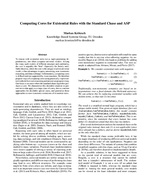Computing Cores for Existential Rules with the Standard Chase and ASP
Aus International Center for Computational Logic
Computing Cores for Existential Rules with the Standard Chase and ASP
Markus KrötzschMarkus Krötzsch
Markus Krötzsch
Computing Cores for Existential Rules with the Standard Chase and ASP
In Diego Calvanese, Esra Erdem, Michael Thielscher, eds., Proceedings of the 17th International Conference on Principles of Knowledge Representation and Reasoning (KR 2020), 603-613, 2020. IJCAI
Computing Cores for Existential Rules with the Standard Chase and ASP
In Diego Calvanese, Esra Erdem, Michael Thielscher, eds., Proceedings of the 17th International Conference on Principles of Knowledge Representation and Reasoning (KR 2020), 603-613, 2020. IJCAI
- KurzfassungAbstract
To reason with existential rules (a.k.a. tuple-generating dependencies), one often computes universal models. Among the many such models of different structure and cardinality, the core is arguably the “best”. Especially for finitely satisfiable theories, where the core is the unique smallest universal model, it has advantages in query answering, non-monotonic reasoning, and data exchange. Unfortunately, computing cores is difficult and not supported by most reasoners. We therefore propose ways of computing cores using practically implemented methods from rule reasoning and answer set programming. Our focus is on cases where the standard chase algorithm produces a core. We characterise this desirable situation in general terms that apply to a large class of cores, derive concrete approaches for decidable special cases, and generalise these approaches to non-monotonic extensions of existential rules. - Bemerkung: Note: The conference's copyright agreement requires the following link to be shown here: http://www.kr.org
- Projekt:Project: CPEC, DIAMOND, ScaDS.AI
- Forschungsgruppe:Research Group: Wissensbasierte SystemeKnowledge-Based Systems
@inproceedings{K2020,
author = {Markus Kr{\"{o}}tzsch},
title = {Computing Cores for Existential Rules with the Standard Chase and
{ASP}},
editor = {Diego Calvanese and Esra Erdem and Michael Thielscher},
booktitle = {Proceedings of the 17th International Conference on Principles of
Knowledge Representation and Reasoning (KR 2020)},
publisher = {IJCAI},
year = {2020},
pages = {603-613}
}

